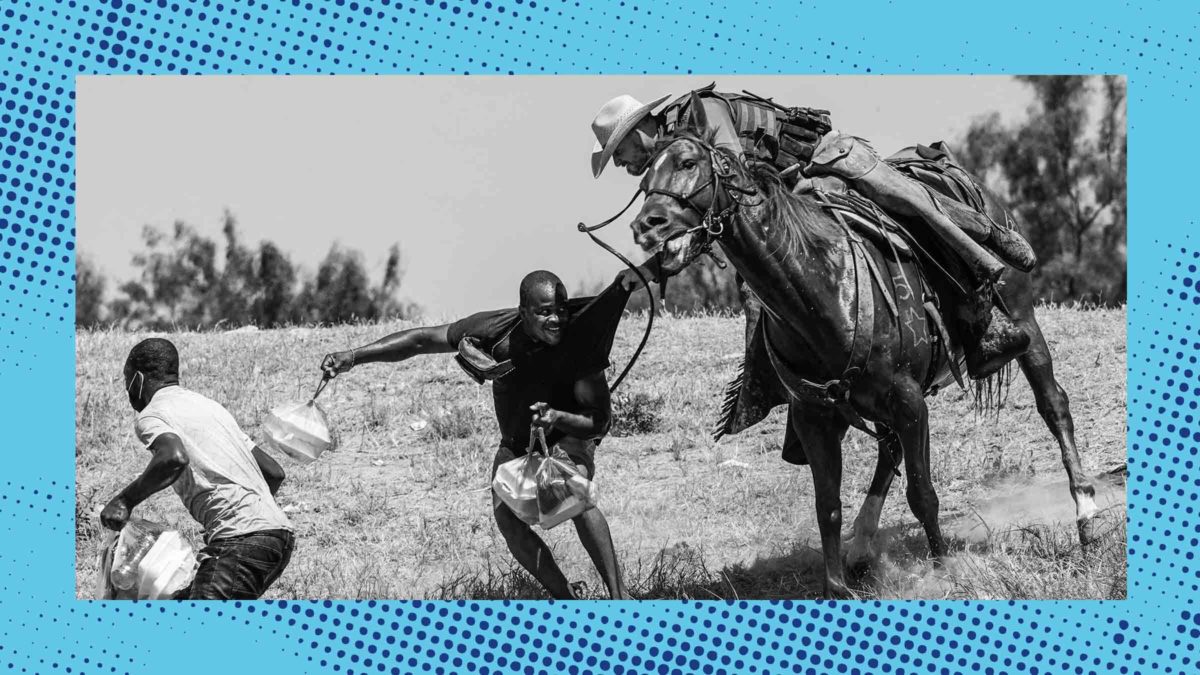Last week, photographers at the U.S.-Mexico border captured shocking images of U.S. Customs and Border Protection (CBP) personnel engaged in conduct eerily reminiscent of that of 19th-century slave catchers: Federal agents on horseback running down Black Haitian migrants making a dangerous trek north in search of freedom from the political and economic turmoil they left behind.
The photographs and video footage have since been near-universally condemned as horrific. This is “simply not who we are,” President Biden asserted, despite centuries of overwhelming evidence to the contrary. Biden also promised that the Department of Homeland Security would carry out one of its famously unproductive investigations into allegations of CBP misconduct. “Those people will pay,” he said. “There will be consequences.”
But if recent Supreme Court rulings provide any indication about the likelihood of justice for migrants abused by government agents, victims of past, present, and future Border Patrol violence have few meaningful options. For decades, countless people in the borderlands have been subject to unchecked state terror, occasionally forcing judges to decide the question of who will pay for those violations of rights that do manage to make it into a courtroom. Troublingly, the Court’s answer these days is “probably nobody.”
In theory, refugees abused by federal agents at the border could seek compensation under the standard the Court established in 1971 in Bivens v. Six Unknown Named Agents. The justices recognized in that case that people have an implied right to sue federal agents who violate their constitutional rights. But the Court has spent the fifty years since Bivens hollowing out that right. Some of its most outrageous post-Bivens jurisprudence has forced noncitizens near the border into a uniquely dangerous position, turning thousands of square miles into a de facto consequence-free zone for official misconduct.
The Court delivered its most severe blow to Bivens’s protections last year in Hernández v. Mesa. In that case, a CBP agent on the U.S. side of the border shot and killed Sergio Adrián Hernández Güereca, an unarmed Mexican teenager, on the Mexico side of the border in 2010. The Hernández family says Sergio, 15, was playing a game with his friends, running back and forth across a dry cement culvert that separates El Paso, Texas and Ciudad Juarez, Mexico. The agent, Mesa, claims that Sergio and his friends were trying to cross the border, and threw rocks at him before running back to the Mexico side; per The Washington Post, cell phone footage appears to contradict his version of events. What happened next was an appalling and fatal escalation: Agent Mesa shot Sergio in the face. The CBP declined to discipline the agent—shocker—and the U.S. denied extradition to Mexico.
The right to be free from victimization by armed state agents is meaningless if nothing happens when you are victimized by armed state agents.
The only real opportunity for legal redress, then, would have been letting the teen’s family sue the agent under Bivens. The Court was asked to consider whether the boy’s family had that right. Justice Samuel Alito’s answer for the Court was, more or less, “Sorry, but no.”
Alito, joined by Chief Justice Roberts and Justices Clarence Thomas, Neil Gorsuch, and Brett Kavanaugh, reasoned that the cross-border nature of the shooting meant that the family’s Bivens claims arose in a “new context,” and that foreign relations and border security implications “counseled hesitation” against judicial intervention. Basically, the five conservatives decided that the Court should stay out of it because foreign policy is not a judge’s job. This might make sense if “it” were not “the judiciary’s obligation to provide remedies for unconstitutional intrusions on protected rights,” and “foreign policy” were not “a U.S. agent standing on U.S. soil literally shooting and killing a child.” The same Court that has no problem running roughshod over the executive when the White House tries to prevent mass homelessness during a pandemic is suddenly deeply wary of interfering with executive authority when asked to stand up for gunned down brown children.
The consequences of the Court’s refusal to act have been both predictable and tragic: CBP can harm people at the border at will, and the victims just have to live with it, if they are lucky. Some appellate judges, bound to follow Court precedent, have been begging the Court to change its mind, openly “lamenting today’s rights-without-remedies regime.” Just a few weeks ago, another appellate court bemoaned the fact that Hernández foreclosed the possibility of extending Bivens relief to the surviving family of another person killed by CBP.
The facts in that case, Quintero Perez v. United States, bore a grim resemblance to Hernández: A CBP agent on U.S. soil shot and killed a Mexican national, Jose Alfredo Yañez Reyes, whose body straddled the border where he fell. But following Court precedent, the Ninth Circuit Court of Appeals determined that the context was “new,” since no one was fatally shot in Bivens, and that the circumstances were “special,” because the conduct of Border Patrol personnel on the job, under Hernández, implicates national security. The court called Yañez’s death “tragic,” and expressed “regret that the law compels this result.”
Because the judicial branch has made clear that Border Patrol can do whatever it wants at the border without facing significant consequences, it is up to the legislative and executive branches to ensure that victims receive any kind of justice. This possibility, however remote in an era in which Congress can barely agree on anything more controversial than naming a post office, does not excuse the Court’s inaction. The Court’s choice to tie the legal system’s hands makes everyone more vulnerable to government abuse, and especially endangers members of historically marginalized groups. The right to be free from victimization by armed state agents is meaningless if nothing happens when you are victimized by armed state agents. The ultimate arbiter of law in this country has given its blessing to state-sanctioned lawlessness.
The White House, for its part, has announced that CBP agents will discontinue its use of horse patrols at the border. But the agents’ precise mode of transportation, of course, is missing the point. The government’s capacity for inflicting violence against noncitizens is not dependent on the presence or absence of Secretariat. It depends on whether other government actors are able and willing to serve as a check on such abuse. The Supreme Court is certainly able to act here. It just doesn’t want to do it.

